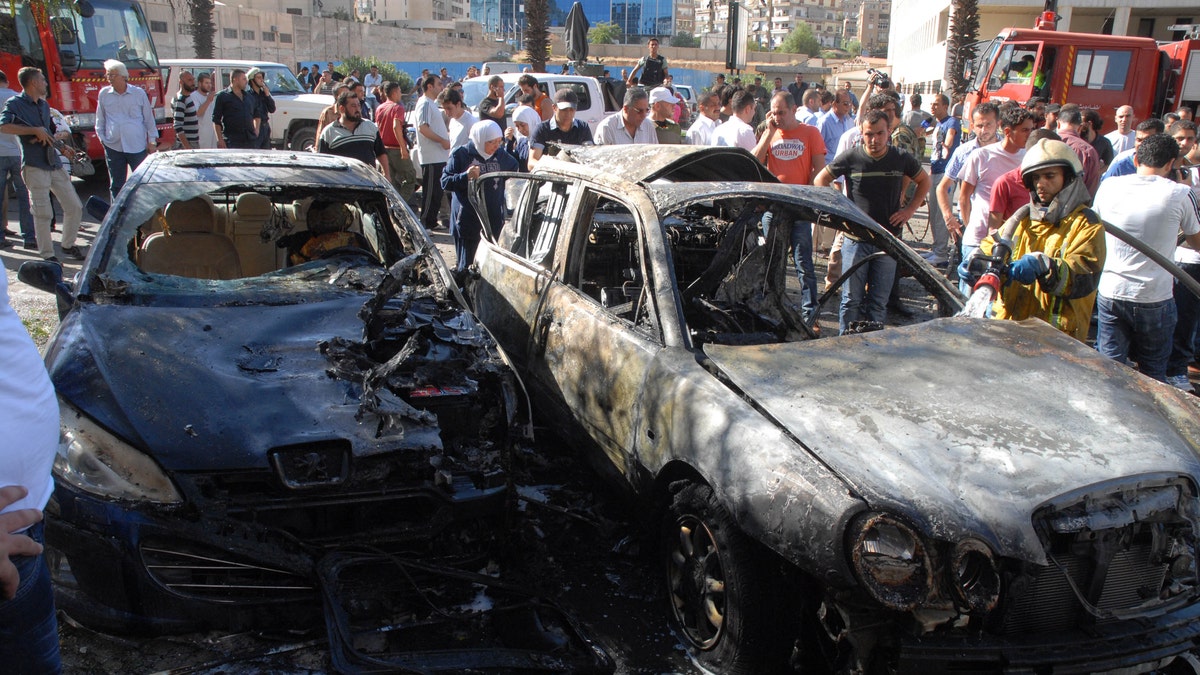
Sept. 7, 2012: In this photo released by Syria's state-run news agency, SANA, a firefighter extinguishes a burned car close to where an explosion went off between the buildings of the Ministry of Information and the Ministry of Justice, which are about 100 yards apart, in Damascus, Syria. (AP)
CERNOBBIO, Italy – U.S. Senators John McCain, Joe Lieberman and Lindsay Graham on Friday urged Washington to help arm Syria's rebels with weapons and create a safe zone inside the country for a transition government. They also called for a far tougher position against Iran over its suspected — and seemingly inexorable — drive toward acquiring nuclear weapons capability.
McCain blasted President Barack Obama, who defeated him in the 2008 presidential election, for recently setting the "red line" for Syria at use of chemical weapons.
"If you're (Syrian President) Bashar Assad ... maybe you interpret that to mean that you can do anything short of chemical weapons before the United States will intervene," the Republican from Arizona told the Ambrosetti Forum, a gathering of political and business leaders on the shores of Lake Como in Italy.
Lieberman and McCain — who together with Graham have toured the volatile Middle East in recent days — both argued that the longer the West waits the more jihadists will gain influence in the rebellion.
"We should be supplying weapons to the opposition to Assad (and) I strongly support the creation of a safe zone," said Lieberman, the 2000 Democratic vice presidential nominee, who has since become a Connecticut independent.
"The opposition has effectively seized control of a piece of land in northern Syria," he said. "If we help them protect themselves from Assad's helicopters and fixed-wing aircraft they can establish a transitional government ... I am confident that if we set it up and told (the regime) that if they attacked it there would be a vigorous response, they would not attack it."
He said such a zone would enable potential future leaders now located in places like Istanbul and Paris to establish a presence among the people.
Recent Turkish efforts to push for just such action ran aground at the United Nations, due both to Russian and Chinese opposition as well as lack of enthusiasm in many Western countries for more direct involvement in Mideast tumult, especially after the less-than-stellar outcomes in Iraq and Afghanistan.
Graham, a Republican from South Carolina, agreed that people in the West are war-weary, but argued that if Obama and his Republican challenger Mitt Romney "would speak out more forcefully about the consequences of doing nothing compared to the consequences of taking a calculated risk, public opinion would change."
"It is better to shape history than to see it pass by," he said.
Lieberman spoke of the human toll.
"There is a slaughter going on," he said of the Syria conflict, whose death toll has reached about 25,000. "Everything that motivated all of us to get involved in Libya is happening in Syria, and more."
He noted that "Assad is the number one ally in the Arab world of Iran, and Iran is that greatest threat to stability in the region and beyond the region at this point."
And on Iran, the three were united in a belief that economic sanctions will not cause Tehran to end its nuclear drive.
McCain argued that with the notable exception of the case of Apartheid South Africa, "sanctions, when we look at history, rarely work" — and in the case of Iran that's exacerbated by a sense that the nuclear program has the people's support.
"We have applied very tough economic sanctions on Iran and they have clearly affected the economy of Iran — but they have not affected the nuclear program one iota," marveled Lieberman. "By its recalcitrance Iran is presenting the rest of the world with only two choices: Do we accept a nuclear Iran and try to contain it — or do we take military action? That's a fateful decision that's got to be made in the months ahead."
Lieberman noted that the UN nuclear agency has shown "evidence that the Iranians are rushing toward having the capability to develop nuclear weapons (that) would be a total change of the balance of power in the Middle East and more broadly in the world," since Iran is a patron of terrorist groups. Lieberman said the "red line" should be the acquisition of capability as opposed to the actual construction of a nuclear weapon.
Graham said he did not expect Israel — whose leaders have been saber-rattling all year in what many suspect is a bluff aimed at sparking tougher Western action — to forever remain inactive.
But he argued that the U.S. should be the one making military threats.
"If the Iranians believed that there's a credible threat of a massive attack by the United States to disrupt their nuclear program and their regime's survivability, they will start thinking differently."
"I believe (Iranian leaders) feel that a nuclear weapon gives them complete immunity forever because the international community will leave them alone if they get that weapon," he said. "The one thing I know they cannot possibly believe is that they can survive a conflict with the United States."



